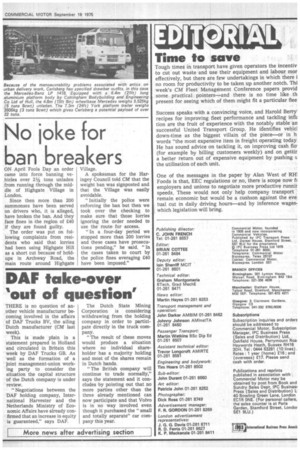Time to save
Page 7

If you've noticed an error in this article please click here to report it so we can fix it.
Tough times in transport have given operators the incentiv to cut out waste and use their equipment and labour mor effectively, but there are few undertakings in which there i no room for productivity to be taken up another notch. Thi week's CM Fleet Management Conference papers provid some practical pointers—and there is no time like th present for seeing which of them might fit a particular flee Success speaks with a convincing voice, and Harold Berry recipes for improving fleet performance and tackling infli tion are the fruit of experience with the notably stable an successful United Transport Group. He identifies vehic] down-time as the biggest villain of the piece—or in h words "the most expensive item in freight operating today. He has sound advice on tackling it, on improving cash flu (for example by billing customers weekly) and on gettir a better return out of expensive equipment by pushing the utilisation of each unit.
One of the messages in the paper by Alan West of RH] Foods is that, EEC regulations or no, there is scope now fc employers and unions to negotiate more productive runnit speeds. These would not only help company transport remain economic but would be a cushion against the eve tual cut in daily driving hours—and by inference wageswhich legislation will bring.
















































































































